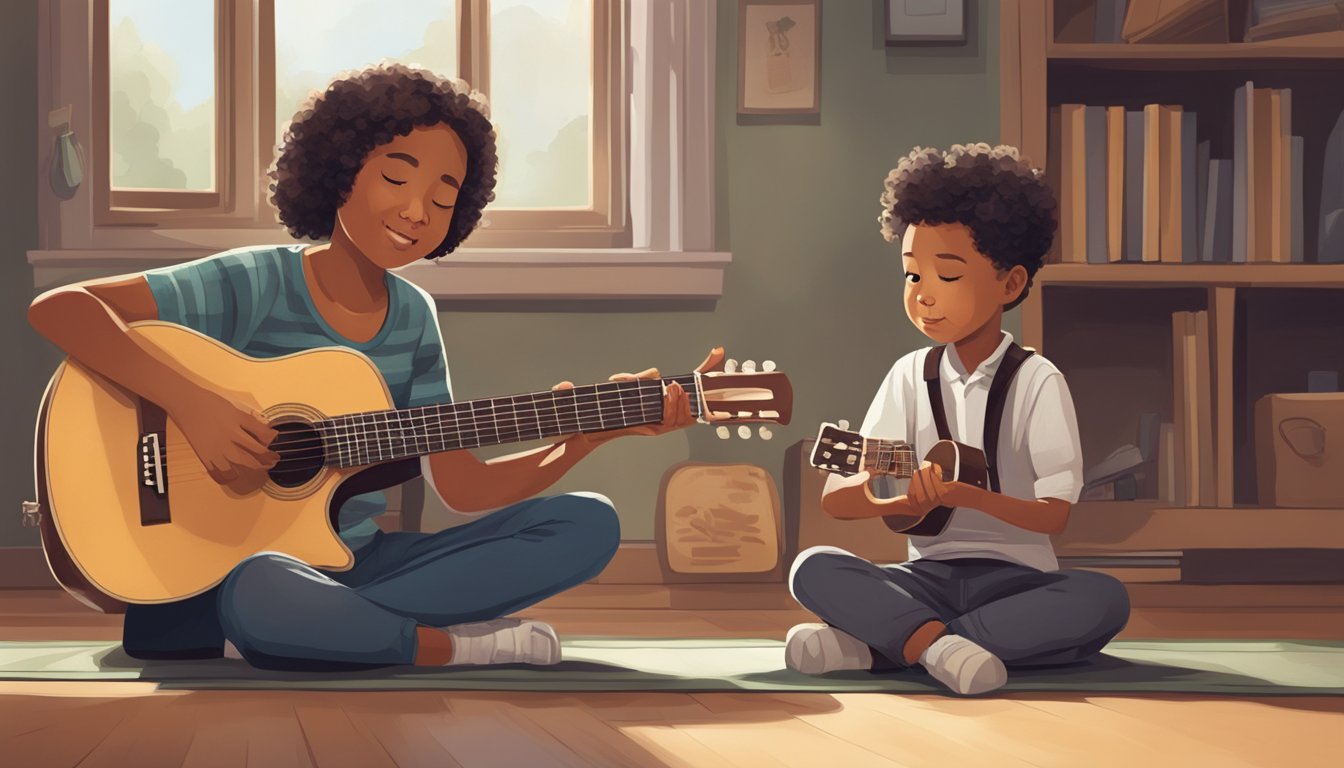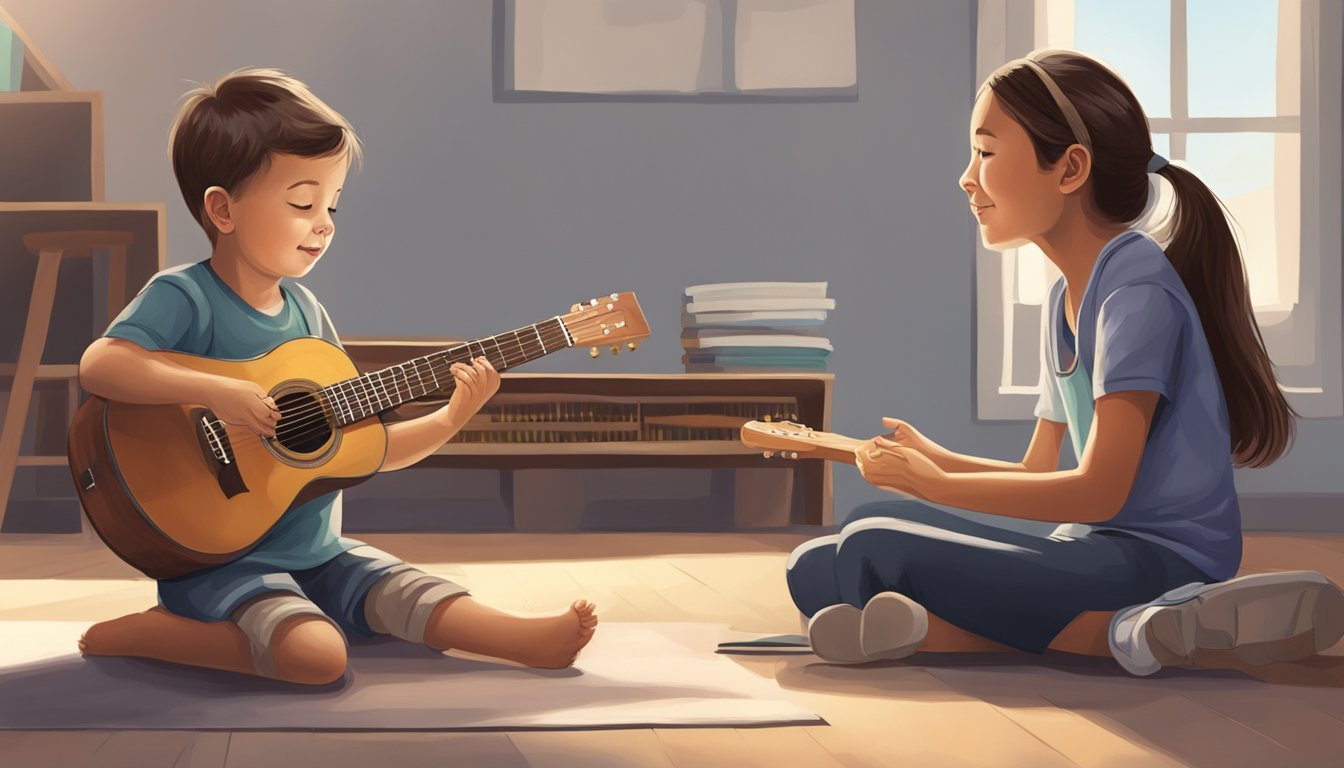Starting guitar lessons can be an exciting journey for you or your child.
Usually, kids are ready to begin guitar lessons around 6 to 10 years old.
But, the best age ultimately depends on individual readiness and interest.
As kids develop fine motor skills and the ability to focus, they become more prepared to take on lessons and enjoy the process of learning music.

If you’re thinking about when to dive into guitar lessons, enthusiasm plays a big role.
If you or your child is eager to learn and practice, that motivation can lead to better results, regardless of age.
With the right support and resources, starting lessons at an appropriate age can lay a strong foundation for musical growth.
Every learner is unique, and finding the right time to start involves considering various factors.
Understanding these aspects can help you make the best choice for a positive and rewarding musical experience.
Key Takeaways
- The ideal age to start guitar lessons is typically between 6 and 10 years old.
- Enthusiasm for learning can significantly impact success in guitar lessons.
- Creating a supportive environment is key to fostering a love for music.
Determining the Right Age to Start

When thinking about the right age for guitar lessons, you should consider both physical and psychological aspects.
Understanding your child’s development helps ensure that they’re ready to learn in an enjoyable way.
Child Development and Guitar Learning
Most kids can start guitar lessons around ages six to ten, but it really depends on their development.
At this age, many children develop basic finger dexterity.
They can form simple chords and handle the weight of the guitar.
Motor skills, like finger strength, are essential for learning an instrument.
Children typically begin to have better muscle control and coordination by age six.
You’ll want to assess if they can hold a guitar and press down on the strings.
Cognitive development is also important.
Kids should be able to understand instructions and stay focused.
An attention span of around 20-30 minutes can help them practice effectively.
If your child shows readiness in these areas, they’re likely prepared to start.
Psychological Factors
Your child’s interest in music and motivation to practice are big factors in their success.
If they show enthusiasm for playing music, they might be ready for guitar lessons, even at a younger age.
Personality traits matter too.
For example, some kids are naturally curious and eager to learn, while others might need more encouragement.
It’s important to nurture their interest and support them in exploring music.
Keep an eye on how your child feels about music.
If they express a desire to play, it may be the perfect time to introduce them to guitar lessons.
Creating a Supportive Learning Environment

A supportive learning environment is key when your child starts guitar lessons.
It helps build confidence and keeps them motivated to learn.
Two important areas to focus on are choosing the right instructor and selecting an appropriate instrument.
Choosing the Right Instructor
Finding a great guitar teacher can make a big difference in your child’s learning experience.
Look for an instructor who has experience teaching kids.
They should understand how to keep lessons fun and exciting.
Check if the teacher uses games or interactive methods to engage young learners.
It’s also helpful if they can tailor lessons to your child’s interests, whether that’s pop music or classic rock.
Talk to other parents for recommendations.
A supportive teacher can boost your child’s confidence and spark their enthusiasm for music.
Selecting an Appropriate Instrument
Choosing the right guitar is crucial for your child’s learning.
A half-sized guitar can be perfect for younger players.
It’s easier for them to hold and play.
Make sure to consider the guitar’s weight too.
If it’s too heavy, your child might get discouraged.
Test out different styles, like acoustic or electric guitars, to find what excites your child the most.
A well-fitting instrument can have a big impact on their progress in learning to play guitar.
Taking the time to select the best options will help create a fun and supportive atmosphere for your child’s music lessons.
Building a Solid Foundation

Starting guitar lessons at the right age is crucial for building a solid foundation.
When you focus on the basics and incorporate music theory early, it helps your child develop essential skills and a genuine interest in learning the instrument.
Fundamentals of Guitar Playing
The fundamentals are where everything begins.
When your child learns basic finger dexterity, they gain the ability to play simple chords and melodies.
This skill is vital because it builds confidence and keeps them motivated.
Encouraging regular practice is key to mastering these basics.
Setting aside short, consistent practice times each day can make a big difference.
Think about starting with simple exercises like finger placements and strumming techniques.
Using fun songs they enjoy can also keep their interest alive.
With time, they’ll progress through various stages of learning, from basic chords to more complex techniques.
Incorporating Music Theory Early On
Understanding music theory early on can be a game changer.
It helps your child make sense of what they’re playing and why.
Start by introducing simple ideas, such as identifying notes on the fretboard or understanding basic rhythms.
Games and apps that teach music theory can make this learning fun and interactive.
Also, discuss how music is built and structured.
When kids grasp these concepts, they can improvise and create their own music, which boosts their engagement.
The benefits of starting early include a deeper understanding and a greater appreciation for music, setting the stage for lifelong learning.
Frequently Asked Questions
Starting guitar lessons can bring up a lot of questions.
You might wonder about the right age, if young kids are ready, and how to approach teaching them.
Here are some common queries that many people have.
You may also ask how much are guitar lessons and whether private or group sessions are better for beginners.
Understanding the costs and benefits of different lesson types can help you make the best decision.
Additionally, finding a qualified teacher who keeps lessons engaging is important, especially for young learners.
Can toddlers really learn to play the guitar?
Yes, toddlers can start learning basic concepts of music and rhythm, but they may not be able to play traditional guitar just yet.
For very young kids, consider using smaller instruments or rhythm activities as a fun introduction.
What’s the best age for kids to begin learning guitar?
The best age often depends on the child.
Many teachers suggest starting around age 6, as their fine motor skills and attention span are developing.
Some children may be ready a bit earlier or later, depending on their interest and maturity.
Are guitar lessons suitable for preschoolers?
Guitar lessons can be suitable for preschoolers if they show interest and have some basic coordination.
Short, engaging lessons using simple songs can help keep their attention and make learning fun.
Is there such a thing as being too old to start guitar lessons?
Not at all! People can start learning guitar at any age.
Whether you’re 10, 30, or even 60, it’s never too late to pick up the guitar and enjoy making music.
What’s a good approach to teaching a young child to play guitar?
Start with simple songs that they love and use a lot of repetition.
Keep lessons upbeat and fun.
Using colorful visuals or stickers on the guitar can also help them associate notes with fun images.
Do you need to reach a certain age before guitar lessons become effective?
There’s no strict age requirement, but being developmentally ready makes a difference.
Kids around 5 to 6 years old often have the dexterity and focus needed for basic lessons.
It’s really about the individual child’s readiness and interest.

